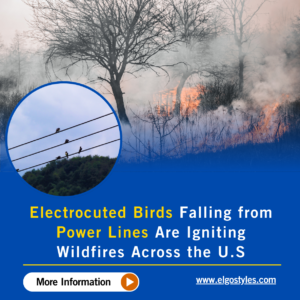Electrocuted Birds Falling from Power Lines Are Igniting Wildfires Across the U.S.
In a surprising and alarming phenomenon, electrocuted birds are causing wildfires across the United States, with a recent report identifying them as a contributing factor in at least 44 wildfires between 2014 and 2018. These avian-related fires have ignited dry vegetation, leading to widespread damage, property destruction, and heightened fire risks.
A study titled “Wildland Fires Ignited by Avian Electrocutions” delves into the details of this concerning trend. Taylor Barnes, one of the study’s authors, explains how birds sitting on power lines often get electrocuted when they come into contact with two conductive parts, causing their feathers to ignite. The burning birds then fall into dry brush, sparking fires. According to Barnes, “Sometimes they burst into flames. Sometimes they just fall dead. Not every bird that is electrocuted will fall to the ground and start a fire.”
While birds perched on power lines may appear harmless, this phenomenon is becoming more common, particularly in fire-prone areas like the Mediterranean ecoregion of California, where there is the highest concentration of bird-caused wildfires. In Colorado alone, three significant wildfires were attributed to bird electrocution incidents in the summer of 2024.

“Sometimes they burst into flames. Sometimes they just fall dead. Not every bird that is electrocuted will fall to the ground and start a fire,” says Taylor Barnes, author of the 2022 study.
One such fire occurred on July 13 in Arapahoe County, Colorado, destroying a property and burning more than 1,100 acres of land. Another fire, ignited on July 31 in Jefferson County near Morrison, was similarly triggered by an electrocuted bird. A 35-acre fire near Denver Water’s treatment plant in Douglas County on August 27 was also linked to a fallen bird carcass. Thankfully, no human casualties have been reported from these incidents, though the destruction to property and land has been substantial.
The Denver Post also reported that birds might be electrocuted while hunting for insects within energized components, increasing the risk of wildfires. Experts have advised electric utilities, especially in fire-prone regions, to implement measures to mitigate these electrocutions by modifying power poles. Such precautions could help reduce the risks posed by avian-caused wildfires and prevent further damage.
As wildfires continue to devastate large parts of the country, the role of electrocuted birds highlights an unexpected contributor to this growing issue. As a result, fire prevention strategies may need to incorporate new approaches to protect not only human property but also wildlife.
 Electrical Engineering World Wiring a Brighter Tomorrow!
Electrical Engineering World Wiring a Brighter Tomorrow!



